The Mark of the Whistler (1944)/The Thirteenth Hour (1947): “…of which they dare not speak…”
Two of the entries in Columbia’s Whistler franchise (based on the popular CBS Radio West Coast mystery program) rarely turn up in the rotation when the film series is shown on Turner Classic Movies. This is a shame, because the first of these—1944’s The Mark of the Whistler—comes close to rivaling the debut movie, The Whistler (1944), as the best in the franchise. Directed by future horror movie maestro William Castle, Mark casts series star Richard Dix as Lee Selfridge Nugent—a down-and-out derelict who happens to come across an interesting advertisement in a discarded newspaper. A local bank has announced that there is money waiting in several abandoned bank accounts, and on the list of these is one belonging to a “Stella Nugent,” a woman who perished in an apartment fire many years ago. The only survivor of the family is her son, conveniently named “Lee,” though he has no middle name.
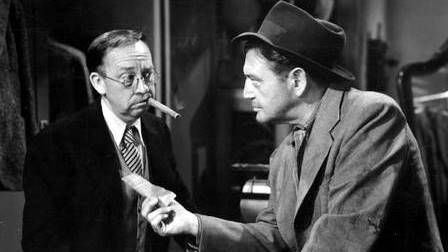 Seeing an opportunity to pick up a quick buck—the bank ad guarantees that each account contains a minimum of one hundred dollars—Selfridge Nugent does a little research on the circumstances surrounding the fire, and convinces a second-hand haberdasher named Joe Sorsby (Porter Hall) to bankroll his plan to latch onto the money (with a new suit, room and board, etc.). Nugent is also successful in persuading the bank president (Howard Freeman) that he’s the genuine article…and is astounded to learn that the money in the account totals $29,000. As can be expected, this sudden financial windfall results in a new set of problems for the protagonist.
Seeing an opportunity to pick up a quick buck—the bank ad guarantees that each account contains a minimum of one hundred dollars—Selfridge Nugent does a little research on the circumstances surrounding the fire, and convinces a second-hand haberdasher named Joe Sorsby (Porter Hall) to bankroll his plan to latch onto the money (with a new suit, room and board, etc.). Nugent is also successful in persuading the bank president (Howard Freeman) that he’s the genuine article…and is astounded to learn that the money in the account totals $29,000. As can be expected, this sudden financial windfall results in a new set of problems for the protagonist.
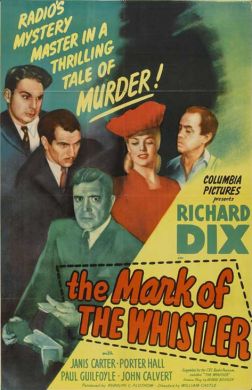 The Mark of the Whistler’s screenplay was one of two Whistler films (the other being 1948’s The Return of the Whistler) based on a short story by author Cornell Woolrich. Here, George Bricker does a first-rate job adapting Woolrich’s “Dormant Account” into a taut screenplay with a few fun plot twists…and one that manages to wring suspense even out of mundane situations such as Freeman’s subtle interrogation to see if Dix’s story checks out. Castle’s direction is also self-assured, utilizing some very effective close-ups. Mark additionally benefits from a strong cast in Janis Carter as a curious reporter who’s anxious to do a story on Dix’s good fortune, and Paul Guilfoyle as a street peddler who comes to Dix’s rescue on more than one occasion. Other familiar character faces include Walter Baldwin, Willie Best, Jack Rice, Arthur Space, Minerva Urecal…and Otto Forrest as the omnipresent narrator.
The Mark of the Whistler’s screenplay was one of two Whistler films (the other being 1948’s The Return of the Whistler) based on a short story by author Cornell Woolrich. Here, George Bricker does a first-rate job adapting Woolrich’s “Dormant Account” into a taut screenplay with a few fun plot twists…and one that manages to wring suspense even out of mundane situations such as Freeman’s subtle interrogation to see if Dix’s story checks out. Castle’s direction is also self-assured, utilizing some very effective close-ups. Mark additionally benefits from a strong cast in Janis Carter as a curious reporter who’s anxious to do a story on Dix’s good fortune, and Paul Guilfoyle as a street peddler who comes to Dix’s rescue on more than one occasion. Other familiar character faces include Walter Baldwin, Willie Best, Jack Rice, Arthur Space, Minerva Urecal…and Otto Forrest as the omnipresent narrator.
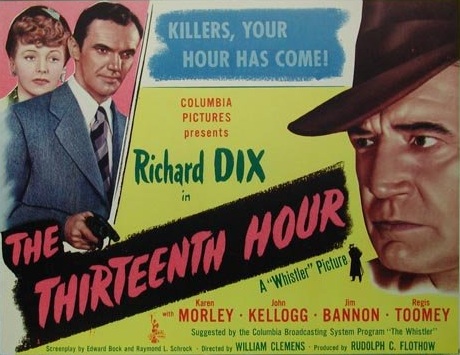 While Mark of the Whistler has been shown on television before (I have a copy recorded from a 1990s airing on the Encore Mystery Channel), The Thirteenth Hour (1947), the penultimate Whistler film, is a lot harder to locate. It’s also a little more conventional than most of the Whistler movies. Dix plays a trucking company owner named Steve Reynolds who’s just become engaged to girlfriend Eileen Blair (Karen Morley), the proprietor of a greasy spoon diner. Steve won Eileen away from a state patrol cop named Don Parker (Regis Toomey), and because of that there’s a little bad blood between the two men. The hard feelings deepen when Parker investigates an accident involving Steve and his truck (the vehicle slammed into a gas station after Reynolds swerved to avoid hitting a car on his side of the road). Steve, alas, has no witnesses—even a hitchhiker he picked up shortly before the accident has taken a powder—so he is arrested on a drunken driving charge.
While Mark of the Whistler has been shown on television before (I have a copy recorded from a 1990s airing on the Encore Mystery Channel), The Thirteenth Hour (1947), the penultimate Whistler film, is a lot harder to locate. It’s also a little more conventional than most of the Whistler movies. Dix plays a trucking company owner named Steve Reynolds who’s just become engaged to girlfriend Eileen Blair (Karen Morley), the proprietor of a greasy spoon diner. Steve won Eileen away from a state patrol cop named Don Parker (Regis Toomey), and because of that there’s a little bad blood between the two men. The hard feelings deepen when Parker investigates an accident involving Steve and his truck (the vehicle slammed into a gas station after Reynolds swerved to avoid hitting a car on his side of the road). Steve, alas, has no witnesses—even a hitchhiker he picked up shortly before the accident has taken a powder—so he is arrested on a drunken driving charge.
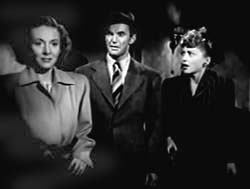 Because it’s his first offense, Steve avoids a six-month prison sentence and instead receives probation…but one of the terms of his probation is that he forfeits his drivers’ license. Desperate to make sure a truckload of fruit reaches its destination before it rots (if it doesn’t get there, Steve will lose the contract, and possibly his business), he agrees to get behind the wheel to transport the fruit. During the trip, he’s knocked out by a mysterious assailant…who soon meets up with cop Parker and quickly dispatches him. Unfortunately, Steve is fingered for the deed. So, with Eileen’s help, he desperately tries to prove his innocence.
Because it’s his first offense, Steve avoids a six-month prison sentence and instead receives probation…but one of the terms of his probation is that he forfeits his drivers’ license. Desperate to make sure a truckload of fruit reaches its destination before it rots (if it doesn’t get there, Steve will lose the contract, and possibly his business), he agrees to get behind the wheel to transport the fruit. During the trip, he’s knocked out by a mysterious assailant…who soon meets up with cop Parker and quickly dispatches him. Unfortunately, Steve is fingered for the deed. So, with Eileen’s help, he desperately tries to prove his innocence.
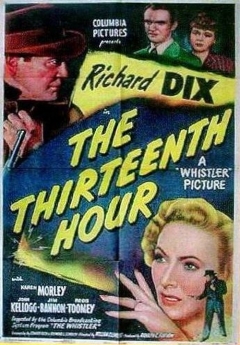 With a screenplay by Edward Bock and Raymond L. Schrock (based on a story by Leslie Edgley), Thirteenth Hour manages to mix Dix’s bid to clear himself with a stolen car ring (headed up by OTR veteran Jim Bannon) and a diamond theft in its brief 65-minute running time. The twist ending to the film, unfortunately, becomes pretty obvious at a certain point. Still, Thirteenth Hour is an entertaining B-noir that features strong performances from Dix and Morley (the latter a particular fave of mine), and also has on hand serial henchman stalwarts Anthony Warde and Ernie Adams, not to mention Cliff Clark, better known as “Inspector Donovan” in the Falcon movies with George Sanders and Tom Conway. It also served as the final onscreen appearance for actor Richard Dix, who would retire from the movie business that year and leave this world for a better one two years later (in 1949).
With a screenplay by Edward Bock and Raymond L. Schrock (based on a story by Leslie Edgley), Thirteenth Hour manages to mix Dix’s bid to clear himself with a stolen car ring (headed up by OTR veteran Jim Bannon) and a diamond theft in its brief 65-minute running time. The twist ending to the film, unfortunately, becomes pretty obvious at a certain point. Still, Thirteenth Hour is an entertaining B-noir that features strong performances from Dix and Morley (the latter a particular fave of mine), and also has on hand serial henchman stalwarts Anthony Warde and Ernie Adams, not to mention Cliff Clark, better known as “Inspector Donovan” in the Falcon movies with George Sanders and Tom Conway. It also served as the final onscreen appearance for actor Richard Dix, who would retire from the movie business that year and leave this world for a better one two years later (in 1949).

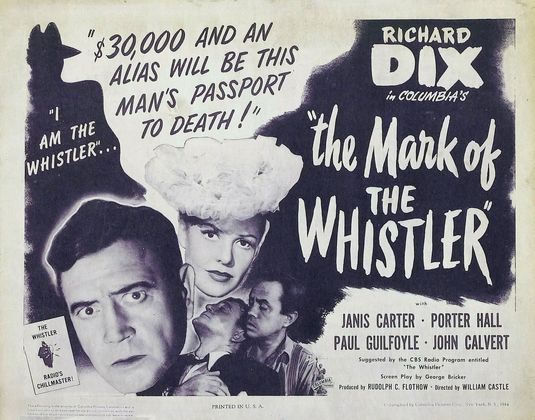

[…] Mark of the Whistler (1944) […]
[…] of Thrilling Days of Yesteryear) & Radio Spirits: The Whistler, Mark of the Whistler, Voice of The […]
[…] of Thrilling Days of Yesteryear & Radio Spirits: The Whistler, Mark of the Whistler, Voice of The […]
[…] of Thrilling Days of Yesteryear & Radio Spirits: The Whistler, Mark of the Whistler, Voice of The […]
[…] were adapted to make many “dark city” movies (not to mention radio and TV shows) like The Mark of the Whistler (1944; “Dormant Account”), Fear in the Night (1947; “Nightmare”), The Window (1949; […]